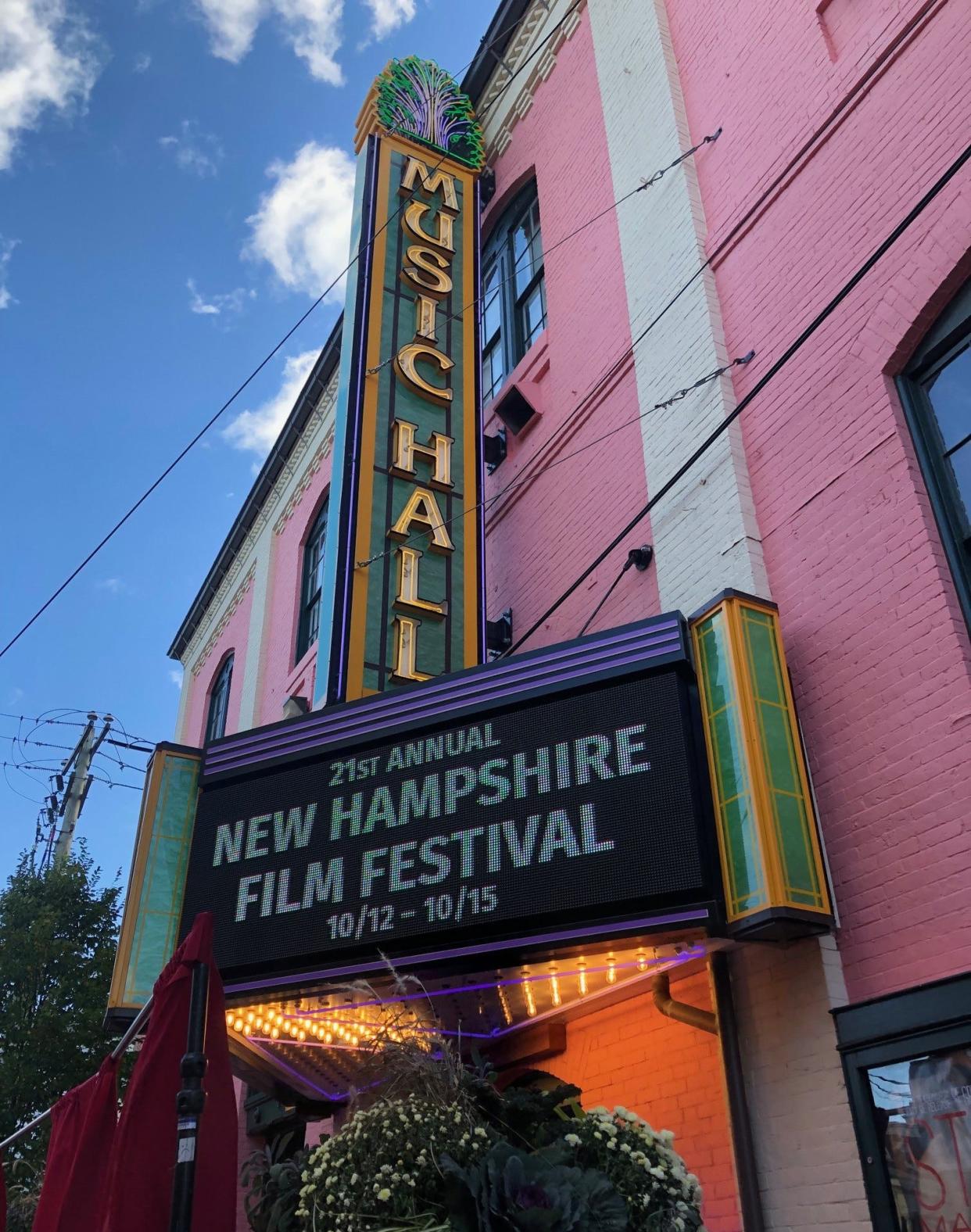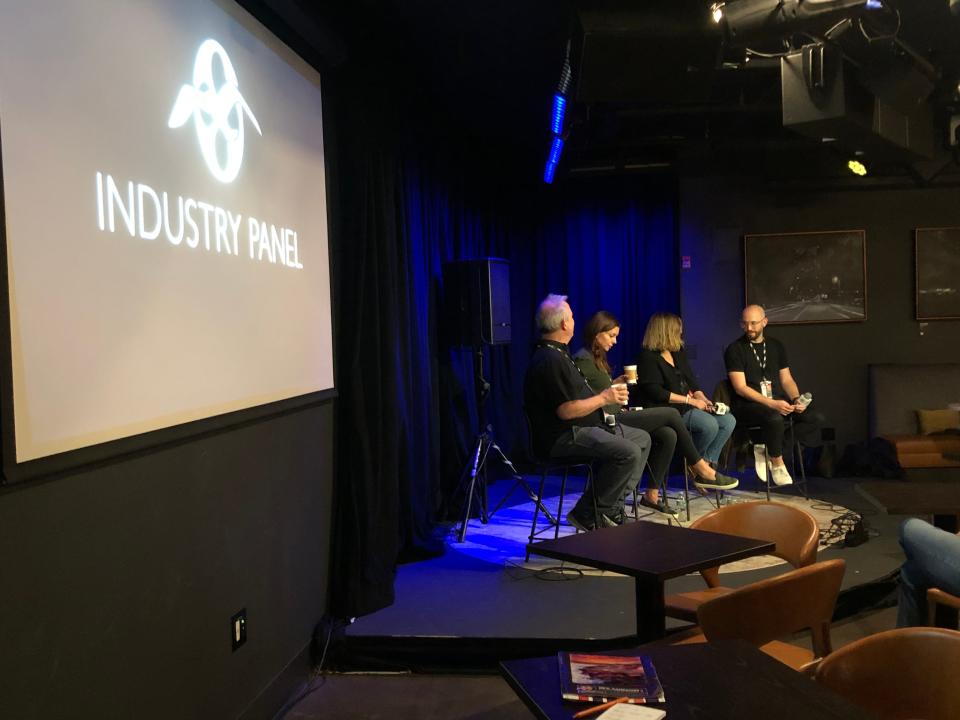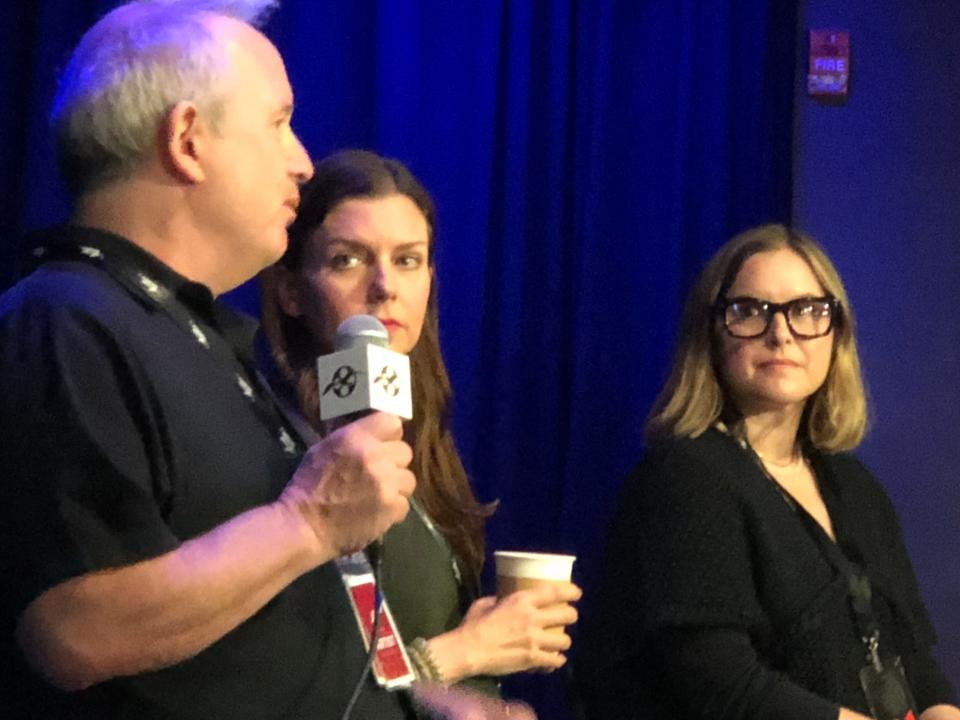NH Film Festival: Which films won honors and which shorts qualified for Academy Awards

- Oops!Something went wrong.Please try again later.
PORTSMOUTH — The 21st annual New Hampshire Film Festival screened more than 100 films at four Portsmouth venues last weekend for thousands of film lovers. It also presented several panels that offered everything from film industry insight to comedy.
After opening on Thursday with a day devoted to films created, produced, written and directed by New Hampshire filmmakers, the festival on Friday hosted a panel providing a behind-the-curtain look at the state of the film industry today.
The “Industry Insiders” panel featured writer, director and producer Julian Higgins as moderator along with panelists Ted Hope, a film producer and executive who has made 138 films; writer, producer and director Vanessa Hope, whose documentary “Invisible Nation” was produced with her husband Ted and shown at the festival on Friday; and Lis Rowinski, a TV producer and executive.
The panel’s discussion covered the ongoing actors’ strike, the writers’ strike that was recently settled, and the growing funding challenges facing today’s filmmakers.
Vanessa Hope was given permission to spend two years filming Taiwan’s first female president, Tsai Ing-wen for “invisible Nation.” The film follows Taiwan’s struggle to be recognized as an independent democracy on the world stage and illuminates the country’s vulnerability in the face of China’s absolute denial of its status as a democracy. It explains the history of how Taiwan got to where it is today and the compelling film inspires the viewer to want to take action to ensure Taiwan’s freedom lives on in a world of growing authoritarianism.

“The dream of what we hope movies can do, inspiring people and inspiring more storytelling along the lines that will get people excited about stories they haven't heard about, places they haven't heard about, and be comfortable talking about them. That's more of where our film about Taiwan is,” Ted Hope said. “The call to action isn't ‘Buy shoes.’ The thinking is let Taiwan be the example, not the exception. What you're going to see is incredibly inspiring and what has happened in the world is unfortunately not to allow Taiwan's voice to be leading the conversation about its own future and, and so it's a very strong story about democracy.”
Vanessa Hope spoke about how many of the streaming services are no longer buying independently-produced documentaries because she said they don’t make enough money from them.
“The democratization of storytelling, the diversity of stories from storytellers with the inclusivity that we all want, is now being controlled at the top and people who are going out there like me, off to Taiwan, thinking like ‘Wow, this is a great documentary idea,’ I'm getting access to a first female president, surely everyone is gonna want to finance this and I'm gonna get every grant I applied for. I'm kidding myself in today's landscape,” she said. “And now when our film is ready, there is basically no distribution market. That is absurd. And it's not just our film. … There are 30 other films by A-list directors, Oscar-nominated, winning awards at the top festivals that are documentaries, that speak truth to power, stories that were not made in-house at a streamer, that are not getting distribution.”

She said the streaming companies abandoning the purchasing of independent documentaries will have a chilling effect on what films get made, and on the number that will be made in the future.
“It’s a moment in time when labor is waking up and striking, and fighting for what it deserves. … Part of the fight is not really just at the grassroots level. I think you need both the grassroots and you need to hold power accountable at the top so what has happened with streaming with Apple, with Amazon, with Netflix, and how they are now producing in-house, they're controlling the narrative and the larger argument is about how the more consolidation of money and power you have in monopolistic ways at the top, the more the downstream effects are censorship,” Vanessa Hope said.
Higgins led the discussion to the ongoing entertainment industry strikes.
“it's not just our industry. There’s a nationwide if not worldwide labor movement going on right now that is very significant. … This is the most visible version of it up to the UAW strike, I think, because everybody engages with what we do. Everyone watches movies, television media of all kinds, and feels the effects of these strikes,” Higgins said.
He talked about the industry’s strikes focusing attention on the cost of creating films.
“The perversion of it all is that there's a reason why human beings make art, which is extremely important to our flourishing. It's not just like a fun thing you do on the weekends. This is a fundamental part of the human experience. It's extremely important. And the perversion of it is when the goal is to maximize profits,” Higgins said. “We just stop talking about completely. Even this panel, we're going to have to work hard to remember why we actually make movies and try to talk to other people about stories. … The economics of it is so overwhelming, that it's so easy to just slide off the edge of the cliff and just never talk about why we do this at all.”
Higgins said the strikes clarified the growing threat of artificial intelligence.
“When you have a dynamic where artists are providing the material that allows the companies to be profitable, and then you have the artists saying we're not doing that anymore. You can then see the existential threat of AI,” Higgins said. “It's pretty, pretty straightforward. The best thing to do would be to pay no one and just dictate what you want to a bot and have it generated for you. And then you have the bot also animate it for you photo realistically. And you just sit in your hot tub and rake it in.”
Rowinski said the streaming companies are tightening their belts as they more clearly defined their business models.
“This is more on the television side, but for the last few years, the global streaming platforms were growing and trying to increase their footprints while we were dealing with the pandemic. Everyone was trying to compete with each other and they were overspending, but it was all in the spirit of trying to get that material on your platform to bring eyeballs and subscribers to your platform,” Rowinski said, noting many of the streamers have gone through reorganizations in the last few years.
She said she believes this will also change the formats produced. “I think it is shifting back a little bit more toward a traditional TV feel where you know now because the studios in these streaming platforms, the economics just make a lot more sense if you have something that is built to go as long as possible because you can amortize the cost of your sets and all sorts of other things over a longer period of time.”
“I think we're going to see more closed episodic storytelling like a season-long mystery that is threaded throughout, but each episode will have its own contained story where you'll have sort of like a mini story,” she said. “… You can dip in and dip out, and just consume one episode. You don't have to commit eight hours of your life in order to get a satisfying story.”
Vanessa Hope talked about the importance of local regional film festivals for independent filmmakers. “We are bringing our stories to you. We've raveled across the country once. We're going to do it again and then we go to Europe, to Amsterdam with this film,” she said. “… It’s about sharing and being able to talk about stories locally, nationally, and tell the truth and speak truth to power and we can't have that shut down.”
Award winners
On Saturday, the festival’s Van McLeod Award was presented in a special ceremony preceding the Annual Comedy Panel. The award recognizes New Hampshire natives and residents who have made significant contributions in film and television, This year’s recipient was Marcy Carsey.
The festival’s main awards, known as the “Granny Awards” because they’re made of solid granite, can help filmmakers market their films and potentially secure a distribution deal.
This year, the documentary film “Maestra” won the Best Feature Documentary award. It tells the story of five women from around the world who are breaking glass ceilings in the male dominated world of orchestral conducting.
The documentary “In The Whale,” which tells the story of the Provincetown fisherman who was trapped in the mouth of a humpback whale. At its world premiere at the NHFF, the film won Audience Choice/Documentary.
Here’s the list of the festival’s main awards, which were presented Sunday night:
Best Screenplay: Imogene’s Tornado (written by Andrew Braunbhar)
Best Student Film: Homing (directed by Ricardo Varona)
Best Short Comedy: Catherine & Michael (directed by Kathy Fusco)
Best Short Drama: Mandarins (directed by Chelsie Pennello)
Audience Choice, Documentary: In the Whale (directed by David Abel)
Audience Choice, Narrative: Hangdog (directed by Matt Cascella)
Grand Jury Award, Documentary: Hummingbirds (directed by Silvia Del Carmen Castaños & Estefanía “Beba” Contreras)
Grand Jury Award, Narrative: Mountains (directed by Monica Sorelle)
Shorts Jury Award, Documentary: Denial (directed by Paul Moakley and Daniel Lombroso)
Shorts Jury Award, Animation (Academy Award-qualifying): Aikāne (directed by Daniel Sousa, Dean Hamer & Joe Wilson)
Shorts Jury Award, Live Action (Academy Award-qualifying): The Fuse (directed by Kevin Haefelin)
Best Documentary Feature: Maestra (directed by Maggie Contreras)
Best Narrative Feature: Our Son (directed by Bill Oliver)
This year’s New Hampshire Awards were presented on Thursday night at the end of New Hampshire Day and Night:
Best NH Performance: Charlie Statires (Lobster Trap)
Best NH Short Documentary: Will You Remember Me? (directed by Will Dowler)
Best NH Short Narrative: Junk (directed by Charlotte Hornsby and Jesse Ruuttila)
NH Filmmaker of the Year: Brantley Palmer (Everything to Entertain You: The Story of Video Headquarters)
Best NH Feature Documentary: Sara’s Circus (directed by Megan Frappiea and Bryant Naro)
Best NH Feature Narrative: Merry Good Enough (directed by Caroline Keene and Dan Kennedy)
NH Short Film of the Year (Jury Award): Lost Nation (directed by Hannah Cabell)
This article originally appeared on Portsmouth Herald: NH Film Festival 2023: Which films qualified for Academy Awards

